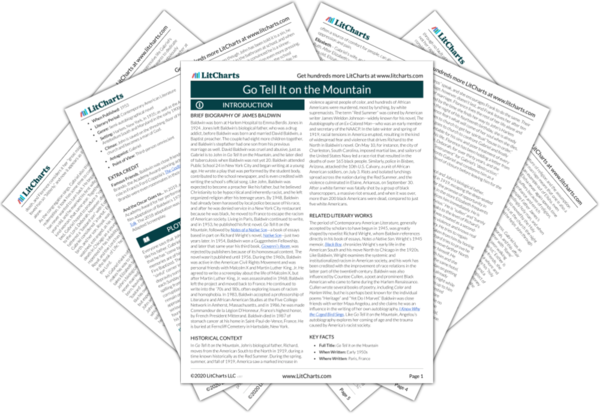Deborah Quotes in Go Tell It on the Mountain
When men looked at Deborah they saw no further than her unlovely and violated body. In their eyes lived perpetually a lewd, uneasy wonder concerning the night she had been taken in the fields. That night had robbed her of the right to be considered a woman. No man would approach her in honor because she was a living reproach, to herself and to all black women and to all black men. […] Since she could not be considered a woman, she could only be looked on as a harlot, a source of delight more bestial and mysteries more shaking than any a proper woman could provide. Lust stirred in the eyes of men when they looked at Deborah, lust that could not be endured because it was so impersonal, limiting communion to the area of her shame. And Florence, who was beautiful but did not look with favor on any of the black men who lusted after her, […] reinforced in Deborah the terrible belief against which no evidence had ever presented itself: that all men were like this, their thoughts rose no higher, and they lived only to gratify on the bodies of women their brutal and humiliating needs.
Again, there was her legend, her history, which would have been enough, even had she not been so wholly unattractive, to put her forever beyond the gates of any honorable man’s desire. This, indeed, in her silent, stolid fashion, she seemed to know: where, it might be, other women held as their very charm and secret the joy that they could give and share, she contained only the shame that she had borne—shame, unless a miracle of human love delivered her, was all she had to give. And she moved, therefore, through their small community like a woman mysteriously visited by God, like a terrible example of humility, or like a holy fool. […]There were people in the church, and even men carrying the gospel, who mocked Deborah behind her back; but their mockery was uneasy; they could never be certain but that they might be holding up to scorn the greatest saint among them, the Lord’s peculiar treasure and most holy vessel.
“I asked my God to forgive me,” he said. “But I didn’t want no harlot’s son.”
“Esther weren’t no harlot,” she said quietly.
“She weren’t my wife. I couldn’t make her my wife. I already had you”—and he said the last words with venom “Esther’s mind weren’t on the Lord—she’d of dragged me right on down to Hell with her.”
“She mighty near has,” said Deborah.

Deborah Quotes in Go Tell It on the Mountain
When men looked at Deborah they saw no further than her unlovely and violated body. In their eyes lived perpetually a lewd, uneasy wonder concerning the night she had been taken in the fields. That night had robbed her of the right to be considered a woman. No man would approach her in honor because she was a living reproach, to herself and to all black women and to all black men. […] Since she could not be considered a woman, she could only be looked on as a harlot, a source of delight more bestial and mysteries more shaking than any a proper woman could provide. Lust stirred in the eyes of men when they looked at Deborah, lust that could not be endured because it was so impersonal, limiting communion to the area of her shame. And Florence, who was beautiful but did not look with favor on any of the black men who lusted after her, […] reinforced in Deborah the terrible belief against which no evidence had ever presented itself: that all men were like this, their thoughts rose no higher, and they lived only to gratify on the bodies of women their brutal and humiliating needs.
Again, there was her legend, her history, which would have been enough, even had she not been so wholly unattractive, to put her forever beyond the gates of any honorable man’s desire. This, indeed, in her silent, stolid fashion, she seemed to know: where, it might be, other women held as their very charm and secret the joy that they could give and share, she contained only the shame that she had borne—shame, unless a miracle of human love delivered her, was all she had to give. And she moved, therefore, through their small community like a woman mysteriously visited by God, like a terrible example of humility, or like a holy fool. […]There were people in the church, and even men carrying the gospel, who mocked Deborah behind her back; but their mockery was uneasy; they could never be certain but that they might be holding up to scorn the greatest saint among them, the Lord’s peculiar treasure and most holy vessel.
“I asked my God to forgive me,” he said. “But I didn’t want no harlot’s son.”
“Esther weren’t no harlot,” she said quietly.
“She weren’t my wife. I couldn’t make her my wife. I already had you”—and he said the last words with venom “Esther’s mind weren’t on the Lord—she’d of dragged me right on down to Hell with her.”
“She mighty near has,” said Deborah.











